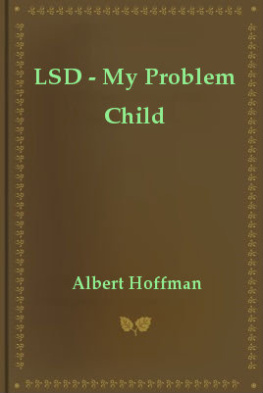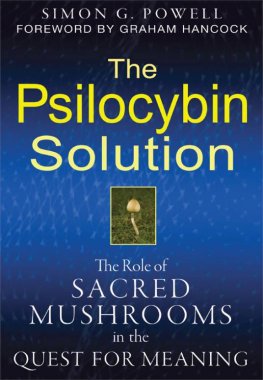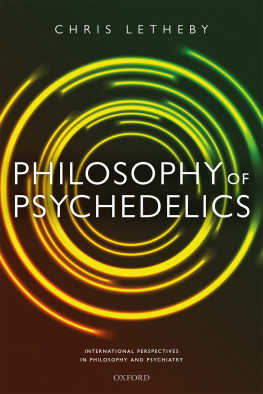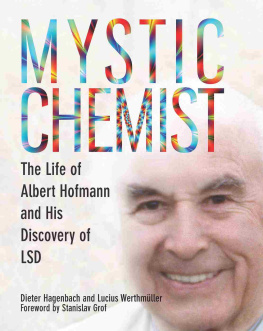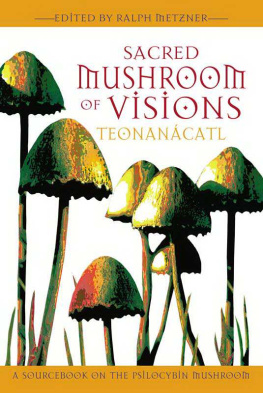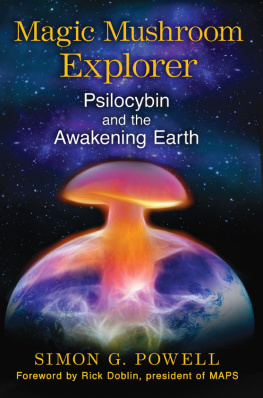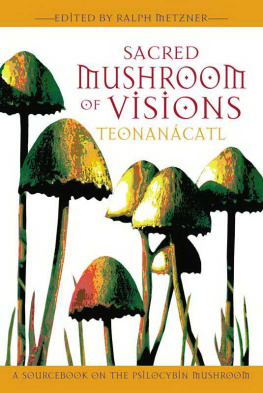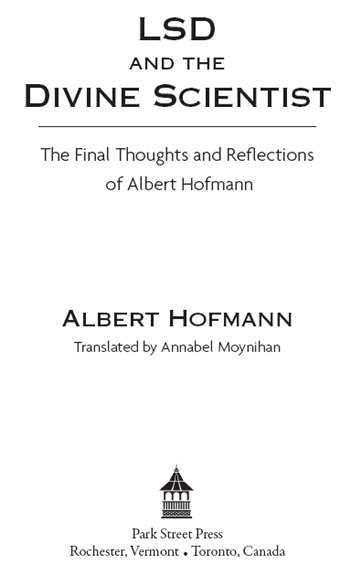
LSD
AND THE
DIVINE SCIENTIST

In this collection, Albert Hofmann shares his scientific, philosophical, psychological, and religious insights in an especially candid and engaging manner. His warmth, candor, and strength of character shine in them all, and through them we gain a satisfying glimpse into a great scientists life.
RICK STRASSMAN, M.D., AUTHOR OF
DMT: THE SPIRIT MOLECULE AND COAUTHOR OF
INNER PATHS TO OUTER SPACE
An extraordinary quality of Albert Hofmann was his ability to integrate the spiritual and the material under the conceptual umbrella of the natural. As his last work, LSD and the Divine Scientist presents Hofmanns most mature thought, the flowering of the scientist as philosopher in a natural integration of science and philosophy. May these final essays be the key to achieving Hofmanns ultimate vision.
NEAL GOLDSMITH, AUTHOR OF
PSYCHEDELIC HEALING
This book is a jewel box of the many facets of Hofmanns mind: as a pure scientist and still in love with the discipline, as a science mystic making a clear-eyed case for the need for the two to blend, as a nature mystic drawing out the implications envisioned and verified in altered states, and as a philosopher of science grappling with the hard questions of death and the fabric of reality itself. Each essay was a rare mixprofound and readable. The essay by Alex Grey about the symbolism in his cover portrait of Hofmann is the perfect conclusion.
JAMES FADIMAN, AUTHOR OF
THE PSYCHEDELIC EXPLORERS GUIDE
Albert Hofmanns creation of LSD and identification of psilocybin had and continues to have a deep and lasting impact on psychiatry, and even more so on Western culture and spirituality. This invaluable collection reveals how, in his personal life, Albert leaned more toward spirituality than psychotherapy. In LSD and the Divine Scientist, Albert Hofmann reveals through his life and his work that we can be involved in spiritual practices while embracing the rigor of scientific methodology and a healthy, productive lifestyle. This inspiring book reveals how fortunate the world is that Albert was the father of LSD and, in profound ways, the spiritual father of millions of responsible psychedelic users.
RICK DOBLIN, PRESIDENT AND FOUNDER OF THE MULTIDISCIPLINARY ASSOCIATION FOR PSYCHEDELIC
STUDIES (MAPS) AND AUTHOR OF MANIFESTING MINDS
The Spiral
In the endless nothingness
is an imaginary point,
the start of every spiral:
the spiral
of the galaxies,
the ammonite,
the double helix.
In spirit, the perfect spiral leads
to eternity.
In time and space,
all spirals are bound,
cut off,
yet they too extend toward
infinity.
TRANSLATORS NOTE
Two years before he passed away, Albert Hofmann celebrated his hundredth birthday in good health, spirits, and mind. More than three thousand people from around the world came to Basel, Switzerland, to honor him, including this translator. The events and the attendees represented a colorful array of the topics and themes that spiral around Albert Hofmann. The book at hand touches on many of these themes. At one hundred years of age, Hofmann was sprightly and bright, and his delighted attitude about life shines through in these essays.
The spiritual core of these essays and poems is an understanding of how subjective reality is inextricably intertwined with the objective world. Reality is created in the mind, which, with its neurological pathways, sensory organs, and other physiological elements, is itself part of the measurable, objective world. For Albert Hofmann the intersection between these two worlds is a place of wonderful mystery.
I have long been drawn to Hofmanns enchanted view of the world we live in. As a graduate student I had the opportunity to translate one of Hofmanns essays for a class. After graduating my first translations were of Christian Rtschs revisions to Hofmann and Richard Schultess book Plants of the Gods. Since then I have worked on additional books and essays about psychoactive plants, including The Encyclopedia of Psychoactive Plants by Christian Rtsch.
Translators are faced with many conundrums, and one of the most common in German is what to do with the word Geist, which means both mind and spirit. Like others, I have chosen one or the other based on the context and my own personal logic. Sometimes the choice is clear, while at other times the choice of spirit over mind seems as if it would add a superfluous intangibility. Mind intuitively sounds more concrete, but of course it isntthus the choice is never perfect, but such is the nature of translation. I would like to thank Deborah Loring, David E. Nichols, and Michael Moynihan for their assistance with this translation, and Jonathan Otts translation of Albert Hofmanns LSD: My Problem Child, an invaluable source for correctly translating the chemical processes involved in the production of lysergic acid diethylamide.
I hope that this translation is faithful both to the objective words of the text and the subjective spirit of their author.
ANNABEL MOYNIHAN
Action and Allowing
Action and allowing are bound to time,
their past and their future are
in the material world.
Love and joy are the infinite nothingness
out of which the world is created
and re-created again.
Through love and joy we are,
each of us,
bound to the Creator
and we become creative
in the material world
with our action and our allowing.
FOREWORD
We are all here to experience happiness, Albert Hofmann liked to say when asked about the meaning of life. His answer sounds so simple and easy, like the Socratic imperative to Know thyself!
One of Albert Hofmanns strengths and attributes was his ability to formulate philosophical ideas with a certain playful ease, using short and simple, yet profound, words. Tun und Lassen (Action and Allowing), the German title of this collection of aphorisms, poems, and articles, is itself such a disarmingly simple and yet complex phrase. A poem that Albert Hofmann wrote in 1993 and sent to his closest friends begins with those words.
He was a mystical friend of nature who kept an eye open for what Ernst Haeckel called the art forms of nature. As an observer not a spectator, he recognized the universal creative principle of nature. With enthusiasm he would examine the variations of the spirals in the ammonites and in the bewitchingly beautiful nautilus shells he collected. Most of all he loved the Japanese sea snail (Pleurotomaria hirasei) and the red triton snail (Cymatium hepaticum).
He saw the spiral as a spiritual principle, as the binding element of matter and spirit, of nature and culture, and as a self-creating power: a guide to the infinite. He expresses these ideas in his poem The Spiral.
As a natural scientist, Albert Hofmann viewed nature itself as the primary material of the mystery. He was fond of saying, If a chemist does not become a mystic, then he is not a chemist either. He understood the natural sciences as a mystical experience. He placed a great value on chance.
For him, the final mystery of deaththe great transitionwas a natural phenomenon. He could only speculate about the answer to the question What is death? In the meantime, he has passed on. For him, everything is clear. For us, it still remains a mystery.
Next page

